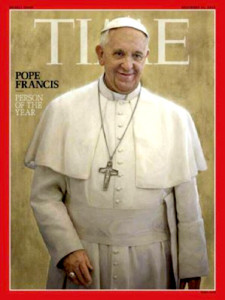 On Friday last week my new issue of Time magazine arrived with a painting of Pope Francis on the cover, because he’s Time’s 2013 “Person of the Year.” I read and highlighted the cover story, because it’s fascinating and, I think, important for Christians to be aware of this mind of thing in terms of understanding the times we live in. If I get a chance I’ll share a thought or two on the article. But for today, I thought I’d pass on a link to this excellent article by Al Mohler. His aim is to help Christians think through how they should feel about all the adulation that is currently being passed the Pope’s way. Here’s is how it ends:
On Friday last week my new issue of Time magazine arrived with a painting of Pope Francis on the cover, because he’s Time’s 2013 “Person of the Year.” I read and highlighted the cover story, because it’s fascinating and, I think, important for Christians to be aware of this mind of thing in terms of understanding the times we live in. If I get a chance I’ll share a thought or two on the article. But for today, I thought I’d pass on a link to this excellent article by Al Mohler. His aim is to help Christians think through how they should feel about all the adulation that is currently being passed the Pope’s way. Here’s is how it ends:
But, even in practical terms, it turns out that the only thing worse than not having a pope is . . . having one.
We might at times think that it would be operationally preferable to have a singular voice and a singular authority to speak for the church. That might seem optimal, if that singular authority were always right, always benevolent, and always true. But there is no such human authority, and the longing for such an authority is not true to the New Testament nor to the model of apostolic doctrine and apostolic structure we actually find in the early church.
In the early church, Paul once faced down Peter; he did not obey him or recognize him as a monarch. In the church, Christ alone is king. In the early church, there were issues that were decided amongst the apostles. There was no pope; there was no papacy; there was no magisterium. There was a spiritual authority, but that authority was the Holy Spirit speaking in Holy Scripture. That pattern remains true until Jesus comes.
Evangelicals committed to the sanctity of life and the integrity of marriage found much to appreciate in the stalwart affirmations of the last two popes on these questions. Likewise, we have found great ground for agreement with much of John Paul II’s theology of the body and Benedict XVI’s defense of the objectivity of truth. We can also appreciate many of the humble gestures and pastoral acts of Francis I. But in such situations we need to remind ourselves that we agree with those popes on these issues because they are right, not because they are the Pope.
TIME magazine has found its “Person of the Year,” but the honeymoon of Pope Francis may soon come to an end. In the meantime, this news should prompt evangelical Christians to understand our own challenges and responsibilities in the present age. Our duty is to make certain that we are indeed faithful to our own task and calling—and, to borrow the language of TIME, that we are putting the right words to the right music.
It’s worth it to read the whole thing.
